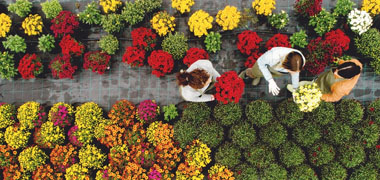
This role has a moderate level of AI exposure. AI can enhance efficiency for some tasks, but this job still relies on human skills and decision-making.
Explore all careersAgronomists work with farmers to improve crop quality, collect data, analyze issues, and suggest solutions to enhance production and crop health.
Get qualified to work as an Agronomist with a course recognised across Australia. Speak to a training provider to learn more.


In Australia, a full time Agronomist generally earns $1,730 per week ($89,960 annual salary) before tax. This is a median figure for full-time employees and should be considered a guide only. As you gain more experience you can expect a potentially higher salary than people who are new to the industry.
 Courses.com.au Team
Courses.com.au Team
There are currently 1,700 people working as an Agronomist in Australia. This number has dropped slightly over the last five years. Agronomy work is usually found in rural areas of Australia where agriculture is common.
Source: Australian Government Labour Market Insights
 Courses.com.au Team
Courses.com.au Team
If you’re thinking of becoming an Agronomist consider a Diploma of Agronomy. This two year course covers all aspects of soil management and crop production. A Diploma of Agriculture may also be suitable.
 Courses.com.au Team
Courses.com.au Team
Browse occupations related to Agronomist



If you're looking to advance your career in the agricultural sector, consider exploring the variety of Agronomist courses in Tasmania. This region offers an array of high-quality programs aimed at experienced learners. Notable offerings include the Diploma of Production Horticulture AHC50324 and the Diploma of Applied Agronomy AHC51920, both of which equip you with the advanced skills required in production horticulture and agronomy. Additionally, the Bachelor of Science (Plant Science) provided by the University of Tasmania lays a solid foundation for those seeking to specialise further in plant sciences.
In Tasmania, the roles associated with agronomy are diverse and integral to the agricultural landscape. With specialised training, graduates can pursue careers as a Farmhand, Organic Farmer, or even a Agricultural Consultant. These roles not only contribute to sustainable farming practices but also promote innovative agricultural methods that benefit the environment and economy in Tasmania. Other job opportunities include positions such as Vineyard Hand and Agricultural Manager, each playing a vital role in the local agricultural ecosystem.
Enhancing your knowledge through Agronomist courses in Tasmania can pave the way to numerous specialised job roles. For instance, individuals can branch out into fields like Agriculture courses or delve into Production Horticulture. Each course not only enriches your skill set but also helps you connect with industry professionals. Moreover, the training providers in the region, such as the University of Tasmania, offer robust educational frameworks that are recognised within the agricultural community.
As you explore the Agronomist courses in Tasmania, consider the vast array of related job roles available. From becoming an Horticulturalist to a Crop Scientist, the opportunities are plentiful for those trained in agronomy. The comprehensive programs available equip graduates with the essential tools to succeed in various agricultural careers. Engaging in these courses not only contributes to personal growth but also fosters a thriving agricultural community in Tasmania.